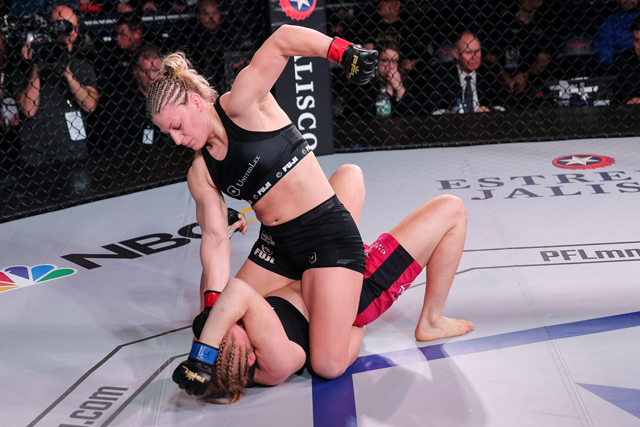Donn Davis’ career has centered around building innovative digital-media companies, and he has clearly brought innovation — and a bit of recent mystery — to the world of mixed martial arts.
The co-founder and chairman of the Professional Fighters League (PFL) has taken technology to a level not previously seen in what is the world’s fastest-growing sport.
The Las Vegas-based PFL, formerly the World Series of Fighting, has brought the innovative SmartCage to MMA, unveiled an OTT platform in August, and will have new products for its upcoming 2021 season and beyond.
“Our philosophy at the Professional Fighters League is: what would be interesting to viewers [and] what would be interesting to fans? We don’t do innovation and technology for innovation and technology’s sake. We focus on the fans. We focus on the viewers,” he said in an exclusive phone interview with Combat Press.
“I think we put our innovation in three ‘buckets.’ One: access. We provide fans all-access to fighters and to what’s going on inside the cage. We’ve given everything from a ref cam, where you can see knockouts from up close, to a corner cam, where you can hear in between rounds the strategy, to the SmartCage, where you see real-time analytics of strike speeds and heart rates of that fight. So, the first kind of innovation we’ve really done is access. ‘What is going on in this fight?’ Viewers can see it from the inside,” Davis said.
“The second thing we’ve really been able to do is choice. We’ve given fans choice. And that kind of choice we’ve been able to give them is on the PFL app next year: you choose your camera angle. How do you want to view this fight? On the PFL app next year, you choose your language. You can choose from six different languages,” he said.
But that’s not all: Next year, the PFL will roll out a real-time gaming feature for cable, television-broadcast (the company has a partnership deal with ESPN), live-streaming and app viewers. The concept is novel yet mind-blowing, like being in a virtual sports book.
“Will [American welterweight contender] Ray Cooper III throw a punch over 30 miles per hour — yes or no? Will [women’s lightweight champion] Kayla Harrison have a takedown in round one under the first minute — yes or no?” Davis explained.
And the name of this new gaming product?
“We’ve gotta keep some mystery, so watch out for a future announcement,” Davis said. “But we think of everything we do not as technology, but innovation that makes it more interesting for fans.”
The PFL was forced to postpone its 2020 season due to the coronavirus (COVID-19) pandemic, but the organization continued to provide salaries to its fight roster of men and women from 25 countries (and growing) in anticipation of its 2021 season, which begins in April.
Davis said that even if next year’s events are held behind closed doors without live audiences, it has far less financial impact on the PFL than it does on other MMA promotions in the United States and globally — again thanks to innovation and technology.
“From the beginning, PFL is a made-for-TV global media-content company. We’ve never been built for the 3,000 people in the stands. We’re built for the three million people who watch,” he said. “Less than five percent of our revenue comes from tickets and a live experience; 95 percent of our revenue comes from a worldwide media audience and sponsorship revenue, so Covid is of immaterial impact to the PFL.”
Just as MMA fighters do, Davis sizes up his league’s rank among the sport’s top-tier organizations, saying the proverbial champion remains the Ultimate Fighting Championship, with the PFL, founded in only 2018, being the top contender.
“So I think what you’re seeing now, by all metrics, is the PFL is the number-two MMA company worldwide,” he said. “In terms of fighter roster, PFL is number two. For a worldwide audience, PFL is number two. In terms of worldwide distribution, PFL is number two, and in terms of growth, PFL is number two.”
The PFL’s fast rise is supported by a unique league format much like major sporting leagues including the NFL and NBA, and a $1 million grand prize to each championship fight winner. This format puts the fate of all fighters into their own hands, PFL officials have said.
“In the NBA, Adam Silver, the commissioner, can’t just tell Lebron [James], ‘Hey, you and the Lakers are in the Finals — you’ve got a lot of social-media followers.’ What the PFL has uniquely done in MMA is a regular season, playoffs, championships, just like the NBA, and the best fighter wins.”
From his home in a quaint, historic town in Northern Virginia, or at his nearby office, Davis constantly ponders what’s next. The questions and answers tend to revolve around familiar, successful themes.
“I tend to focus on three things. One, innovation. How can this be the most interesting and exciting product to MMA fans? Number two, I think about global expansion. Eighty-five percent of the 450 million MMA fans are from outside of the United States. How do we serve those fans?” Davis said. “And number three, business partners. The PFL wants to be the most friendly business-partnering company in the world, and so we talk to a lot of business partners, and how we can create win-win partnerships to help the PFL and grow their businesses.”

